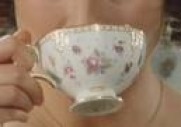
The three women sat at the kitchen table and mostly didn’t talk. They hadn’t known each other much when they ate together in the assisted living dining hall, so why start now, when it was apparent Gretta wouldn’t come back and she’d only had them over out of a desire to use the objects the grandson’s late wife had left behind in the kitchen. A Kitchen Aide blender for pumpkin cupcakes with cream frosting, a non-stick pastry rolling pin for the crust of her cranberry tarts, napkin holders and place card holders, a lace tablecloth, linen placemats, a warmer for the tea, the cutest sugar bowl, a separate dish for each pat of butter, a ceramic honey-dip, a crumb scraper, a boxed set of LP records called Cocktail Piano Time, a pair of tongs for serving petit fours, a crystal vase for daisies, a porcelain vase for lilies, and of course, the full set of china.
Margo sat slumped in her wheelchair, Betty sat wearing her O-Two mask, and Gretta gleefully made use of all the utensils and dishes and she served and served. She also got a good look at the two old women. Betty breathed short quick breaths while Margo’s form slowly rose and fell. Betty wore thick glasses and Margo went without, though neither could see well enough to make out detail. Betty’s eyes were clear but glazed over while a thick yellow pus had accumulated in the corners of Margo’s eyes. They wore polka-dot print dresses that covered their swollen bodies and they wore slippers like all the women at the assisted living home. Margo’s gray mass of wild hair was pinned down while Betty’s thinning white do was combed over and straight. Betty had dandruff on her shoulders. Margot wore false teeth that rolled around in her mouth, seemingly a nervous habit. Betty produced a pack of cigarettes in the middle of a course, with hardly anything eaten the entire afternoon, and the three women lit up, coughing and laughing. The grandson walked through the kitchen not long after, imagining for a second that the women were getting high on his dope, until he got a good look at the factory-rolled Pall Malls. There was decadence in the old birds yet. And he left them to themselves again.
Men are exhausting, Margo finally said.
Amen to that, Betty said.
Still, Gretta said. There’s times for keeping one around.
She loved her tea cups. They seemed shabbier now than when she first saw them, in Yugoslavia. She’d wanted to go to Paris but the best Daddy could do was to spirit her away for a weekend to an East European industrial town that paid him for advice on a new glass plant, Daddy a glass factory engineer. The town had charm and she remembered the name fondly for a time. Then it left her and became, simply, their Yugoslavia trip. She remembers being treated as important, being driven around town and every meal served with an exacting grace. She knew for a fact there was royalty in her genealogy, and she adapted well to being pampered. Her husband, Daddy, was glad that she was glad, and that they were staying alone in a hotel together. She gave him her attention in the evening and spent the days being driven about town, her guide with a British accent and who seemed disappointed when she’d said she was tired of shopping. She wanted to see the museum, the library, the cathedral. Or she felt an obligation to see them. But when she saw the teacups in a jeweler’s window, the history lessons came to an end. The tea cups were hand-painted with gold leaf trim, with each cup and saucer the happiest single hue: crimson, teal, sun-yellow, blood-orange, royal blue, and an ebony that also somehow managed to seem bright. She kept the tea cups when her stash of things got smaller with each successive move, until she’d finally given them to the grandson’s new wife, who had just taken an interest in her life and often sat with her. The grandson was always fond of the tea cups, though she hadn’t used them in decades, lining them up in a cupboard that was bought specifically for the displaying of the tea cups, an immense weighty object lugged from house to house for the sake of the lightest brightest and least useful curios of all. And they weren’t glass. And Daddy despised tea. And she loved them.
Tears came to her eyes now as she drank from the petite sun-yellow tea cup, because it was the first time she’d gotten them out since Daddy’d died, and she regretted not using them more. Neither Betty nor Margo noticed as she wiped her face with a linen napkin and neither listened as she told them the things she’d been reading, the far off towns she’d been visiting over the world wide web, and what it was like to live with a grandson who was the head of the household and all grown up with bad habits, a lazy demeanor, and a cynical outlook.
John Minichillo writes and works in the Mid-South. His work has appeared in Mississippi Review, Third Coast, the anthology Next Stop Hollywood (St. Martin's 2007), In Posse Review, and elsewhere. Forthcoming at Dogzplot and the Norton Anthology of Hint Fiction.
Margo sat slumped in her wheelchair, Betty sat wearing her O-Two mask, and Gretta gleefully made use of all the utensils and dishes and she served and served. She also got a good look at the two old women. Betty breathed short quick breaths while Margo’s form slowly rose and fell. Betty wore thick glasses and Margo went without, though neither could see well enough to make out detail. Betty’s eyes were clear but glazed over while a thick yellow pus had accumulated in the corners of Margo’s eyes. They wore polka-dot print dresses that covered their swollen bodies and they wore slippers like all the women at the assisted living home. Margo’s gray mass of wild hair was pinned down while Betty’s thinning white do was combed over and straight. Betty had dandruff on her shoulders. Margot wore false teeth that rolled around in her mouth, seemingly a nervous habit. Betty produced a pack of cigarettes in the middle of a course, with hardly anything eaten the entire afternoon, and the three women lit up, coughing and laughing. The grandson walked through the kitchen not long after, imagining for a second that the women were getting high on his dope, until he got a good look at the factory-rolled Pall Malls. There was decadence in the old birds yet. And he left them to themselves again.
Men are exhausting, Margo finally said.
Amen to that, Betty said.
Still, Gretta said. There’s times for keeping one around.
She loved her tea cups. They seemed shabbier now than when she first saw them, in Yugoslavia. She’d wanted to go to Paris but the best Daddy could do was to spirit her away for a weekend to an East European industrial town that paid him for advice on a new glass plant, Daddy a glass factory engineer. The town had charm and she remembered the name fondly for a time. Then it left her and became, simply, their Yugoslavia trip. She remembers being treated as important, being driven around town and every meal served with an exacting grace. She knew for a fact there was royalty in her genealogy, and she adapted well to being pampered. Her husband, Daddy, was glad that she was glad, and that they were staying alone in a hotel together. She gave him her attention in the evening and spent the days being driven about town, her guide with a British accent and who seemed disappointed when she’d said she was tired of shopping. She wanted to see the museum, the library, the cathedral. Or she felt an obligation to see them. But when she saw the teacups in a jeweler’s window, the history lessons came to an end. The tea cups were hand-painted with gold leaf trim, with each cup and saucer the happiest single hue: crimson, teal, sun-yellow, blood-orange, royal blue, and an ebony that also somehow managed to seem bright. She kept the tea cups when her stash of things got smaller with each successive move, until she’d finally given them to the grandson’s new wife, who had just taken an interest in her life and often sat with her. The grandson was always fond of the tea cups, though she hadn’t used them in decades, lining them up in a cupboard that was bought specifically for the displaying of the tea cups, an immense weighty object lugged from house to house for the sake of the lightest brightest and least useful curios of all. And they weren’t glass. And Daddy despised tea. And she loved them.
Tears came to her eyes now as she drank from the petite sun-yellow tea cup, because it was the first time she’d gotten them out since Daddy’d died, and she regretted not using them more. Neither Betty nor Margo noticed as she wiped her face with a linen napkin and neither listened as she told them the things she’d been reading, the far off towns she’d been visiting over the world wide web, and what it was like to live with a grandson who was the head of the household and all grown up with bad habits, a lazy demeanor, and a cynical outlook.
John Minichillo writes and works in the Mid-South. His work has appeared in Mississippi Review, Third Coast, the anthology Next Stop Hollywood (St. Martin's 2007), In Posse Review, and elsewhere. Forthcoming at Dogzplot and the Norton Anthology of Hint Fiction.




 RSS Feed
RSS Feed